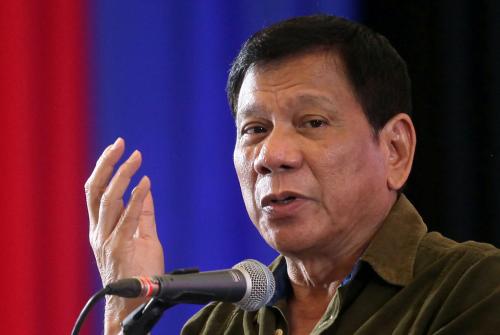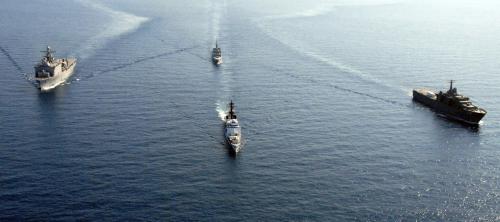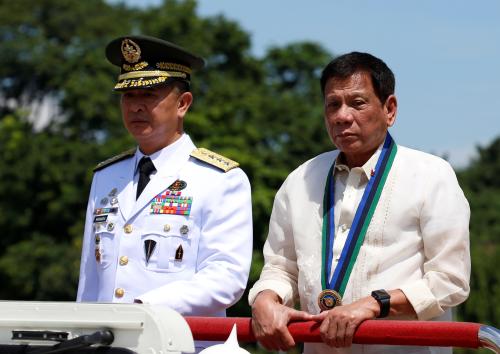In a long-awaited ruling prepared under the United Nations Convention on the Law of the Sea (UNCLOS), an arbitration panel has handed an unequivocal victory to the Philippines in its case against China, which it first filed in early 2013. The arbitration panel deemed invalid virtually all of Beijing’s asserted claims to various islands, rocks, reefs, and shoals in the South China Sea, determining that Chinese claims directly violated the provisions of UNCLOS, which China signed in 1982.
From the outset of Manila’s initiation of the arbitration process, Beijing has refused to participate. However, it did issue a position statement of its own in late 2014, claiming that the arbitration panel violated various UNCLOS provisions and additional agreements signed by the two governments. As the arbitration neared its conclusion, China released a steady stream of editorials and commentaries, claiming that the ruling sought “to deny China’s territorial sovereignty and maritime rights and interests in the South China Sea.”
Beijing has repeatedly stated that “it does not accept any means of third party dispute settlement or any solution imposed on China.” At the same time, UNCLOS has no enforcement mechanism for carrying out the panel’s judgments. But Beijing’s repeated efforts at shaming and stonewalling have imposed an undoubted cost on its political standing in the region. Moreover, China’s signing of UNCLOS obligated Beijing to compulsory third party determination, though it is not the only power contesting this commitment.
Beijing’s repeated efforts at shaming and stonewalling have imposed an undoubted cost on its political standing in the region.
The fundamental weakness of China’s policy defense was its reliance on various “historic claims” to most of the maritime expanses of the South China Sea, including areas that directly encroached on the sovereign territory of various neighboring states. Its claims have frequently been encapsulated in the nine-dash line, an ill-defined geographic demarcation initially appearing in a map prepared by cartographers in the Republic of China in 1947 (i.e., prior to the victory of the Chinese Communist Party in 1949). But China’s sweeping claims to “unequivocal sovereignty” failed to address the multiple layers of ambiguity and conflicting judgments found in various policy documents released by Beijing.
Moreover, the arbitration panel emphasized from the outset that its authority did not extend to determinations over sovereignty. Rather, its mandate (distilled from a list of 15 claims in Manila’s original brief) focused on Chinese claims to the continental shelf and to exclusive economic zones extending from land features, reefs, and rocks over which China claimed indisputable sovereignty. The Philippines also contested Chinese activities that infringed on the rights of Filipino fishermen, Beijing’s construction of artificial islands, and the operation of Chinese law enforcement vessels in various shoals.
Even if Beijing persists in its angry defiance of the arbitration panel’s findings and continues to contest their legitimacy, the sweeping character of the rulings (in a document exceeding 500 pages in length) is impossible to deny. UNCLOS specifically states that land features not deemed an island are entitled only to a 12-mile territorial sea, not to an exclusive economic zone or to a continental shelf. In an especially controversial finding, the panel concluded that Itu Aba (known in Chinese as Taiping Island and the largest land feature in the Spratly Island group and controlled by Taiwan) was not an island; this has been strongly contested by Taipei as well as by Beijing.
The biggest looming issues will focus on how China opts to respond.
The biggest looming issues will focus on how China opts to respond in words and deeds. The arbitration proceeding has triggered strongly nationalistic responses from leaders and experts in China, with many alleging a hidden U.S. hand in the arbitration. American political and military support for the Philippines and other claimants and heightened U.S. air and maritime activities in the South China Sea—all justified as ensuring freedom of navigation in the vital waterways of the region—engenders additional angry responses from the Chinese leadership.
Beijing continues to insist that it is prepared to enter into bilateral negotiations with Manila over various disputed claims. But with China claiming indisputable sovereignty over various contested features and possessing maritime capabilities that vastly exceed those of any other claimants, will it be prepared to demonstrate flexibility, restrain its responses, and give any credence to the diligent labors of the arbitration panel? Can Beijing envision quiet diplomacy, either with the United States or with regional claimants, as opposed to seeing itself as the endlessly aggrieved party? If Beijing doesn’t exercise restraint and instead takes steps that heighten the risks, these could readily pose new threats to the regional maritime order that cannot possibly be in anyone’s interest.
The Brookings Institution is committed to quality, independence, and impact.
We are supported by a diverse array of funders. In line with our values and policies, each Brookings publication represents the sole views of its author(s).











Commentary
How will China respond to the South China Sea ruling?
July 12, 2016